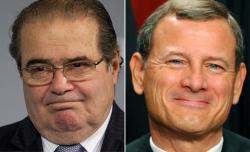In the middle of this week’s three-day health care oral argument marathon at the Supreme Court, the justices pondered how Congress would react if the court struck down the individual mandate and perhaps either part or all of the rest of the 2,700-page health care law. Justice Kennedy, recognizing that the current hyperpolarized Congress cannot get much done, asked if the court in thinking about congressional reaction to its ruling should consider “the real Congress or a hypothetical Congress.”
Justice Kennedy’s question introduced a dose of realism into the debate. Of course the current Congress won’t overcome its differences and do anything constructive if the court kills Obamacare. For the foreseeable future, the court’s word on the health care law will be final.
And if that word is a death knell to Obamacare, it would likely mark the end of any remaining illusions of a “hypothetical Supreme Court.” You know which court I’m talking about—the one where justices act as “umpires,” calling balls and strikes, discovering but not making law, acting with humility and judicial minimalism. The one which Chief Justice John Roberts promised the country at his 2005 confirmation hearing.
The smart money before the argument was on an 8-1 upholding of Obamacare. A 5-4 decision striking the law down for exceeding congressional power will reveal a “real” Supreme Court unafraid of ignoring well-established legal precedent in a favor of its own ideological preferences: It is an activist conservative court that has already opened up the corporate money spigot in Citizens United, that favors “states’ rights” over national solutions to national problems, that could soon bar affirmative action and strike down the Voting Rights Act, which has expanded gun rights and will further weaken reproductive rights, and that has been a friend to business interests above the interests of consumers, minorities, women, and the disabled.
If it overturns Obamacare, the Supreme Court will have revealed its radical nature. That would have three important political implications.
First, for the first time a Democratic candidate may be able to run for president against the Supreme Court. Conservatives have done this in the past, railing against the expansion of rights by the Warren Court, but Democrats have been much less successful. Now the strategy could work. By 2016, both Justice Scalia and Justice Kennedy will turn 80.* If a Republican wins in 2012, Scalia and Kennedy will probably retire before the end of that first term. That would give the new Republican president the chance to entrench the five-justice Republican majority for decades—and to cement it, by replacing Kennedy with a wholly reliable right-wing vote.
The second implication is related to the first: The ever-nasty confirmation battles over Supreme Court justices are likely to get even more acrimonious. No one will be able to pretend that a Supreme Court justice is merely an umpire calling balls and strikes, and it will become more legitimate for senators to expressly take ideology into account when considering whether or not to confirm someone for the high bench. We could well see senators become willing to filibuster Supreme Court nominees for ideological reasons the way they have filibustered lower court judges. That could lead to vacancies on the court, and the court becoming further mired in a partisan morass.
The third and final political implication is that the Court’s legitimacy could suffer in ways which we have never seen. It is true that even Bush v. Gore—the 5-4 decision determining that George W. Bush rather than Al Gore would become president in 2000—did not cause long term damage to the court’s reputation in the eyes of the public. But things are different now, because of the partisan realignment of the Supreme Court.
Partisan realignment is not a new phenomenon for our institutions. It happened in Congress beginning in the Civil Rights movement. There used to be conservative Democrats, especially in the South, and liberal Republicans. These days, the most conservative Democrat in Congress is more liberal than the most liberal Republican. This shift has made it exceedingly difficult to get almost any bipartisan compromise in Congress.
Partisan realignment has now hit the Supreme Court as well. Justice Stevens and Justice Souter were both fairly liberal Justices but both were appointed by Republican presidents. Now the Court’s liberal-conservative split lines up with a party split too. The four liberals—Breyer, Ginsburg, Kagan, and Sotomayor—were appointed by Democratic presidents, and the five conservatives—Alito, Kennedy, Roberts, Scalia, and Thomas were appointed by Republican presidents.
How soon before we start talking of “Democratic justices” and “Republican justices,” and fully expect the justices to decide constitutional law and statutory cases in line with each party’s legislative preference on these issues? Even if the justices really think there is a distinction between the meaning of the Constitution and their party’s political preferences, will the public believe it when the correlation between the two is nearly perfect? This is a far greater danger to the Supreme Court’s legitimacy than allowing a live audio broadcast of the Court’s oral arguments—which the justices still bar.
I have no idea whether or not Justice Kennedy or Chief Justice Roberts will blink when faced with the political implications of a ruling striking down the health care law, the signature achievement of President Obama’s first term. But such a decision could not only influence whether or not Obama gets a second term; it could also change in fundamental ways how justices are chosen and what the public thinks of them and the institution they represent.
Read all of Slate’s coverage of the Affordable Care Act.
Correction, April 3, 2012: This article originally stated that Justice Kennedy will be 78 in 2016. He will be 80. (Return to the corrected sentence.)
